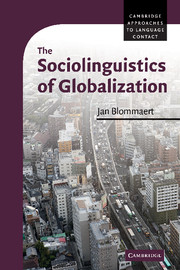Book contents
- Frontmatter
- Contents
- List of illustrations
- Series editor's foreword
- Preface
- Acknowledgements
- 1 A critical sociolinguistics of globalization
- 2 A messy new marketplace
- 3 Locality, the periphery and images of the world
- 4 Repertoires and competence
- 5 Language, globalization and history
- 6 Old and new inequalities
- 7 Reflections
- Notes
- References
- Index
1 - A critical sociolinguistics of globalization
Published online by Cambridge University Press: 05 June 2012
- Frontmatter
- Contents
- List of illustrations
- Series editor's foreword
- Preface
- Acknowledgements
- 1 A critical sociolinguistics of globalization
- 2 A messy new marketplace
- 3 Locality, the periphery and images of the world
- 4 Repertoires and competence
- 5 Language, globalization and history
- 6 Old and new inequalities
- 7 Reflections
- Notes
- References
- Index
Summary
The challenge
Sociolinguistically, the world has not become a village. That well-matured metaphor of globalization does not work, and that is a pity for sociolinguistics – a science traditionally more at ease when studying a village than when studying the world. Globalization is the catchword for a particular historical phase (the capitalist present, so to speak) and even if the processes we call globalization are not new in substance, they are new in intensity, scope and scale. The novelty transpires in the labels we use for them: one of the main features of globalization is that it has spawned its own discourses-on-globalization, thus making it into a self-conscious and seemingly autonomous political, economic, cultural and intellectual project. I will have a word or two to say about the self-consciousness and autonomy, but for now I can restrict myself to accepting the challenge of globalization, that is, to rethink our conceptual and analytic apparatus. The world has not become a village, but rather a tremendously complex web of villages, towns, neighbourhoods, settlements connected by material and symbolic ties in often unpredictable ways. That complexity needs to be examined and understood.
I consider this state of affairs a positive effect of globalization, because it forces us to think about phenomena as located in and distributed across different scales, from the global to the local, and to examine the connections between these various levels in ways that do not reduce phenomena and events to their strict context of occurrence.
- Type
- Chapter
- Information
- The Sociolinguistics of Globalization , pp. 1 - 27Publisher: Cambridge University PressPrint publication year: 2010
- 2
- Cited by

